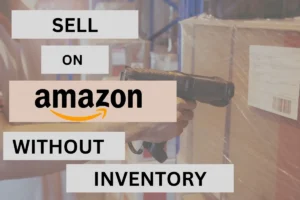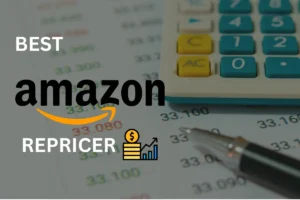In the ever-evolving and fiercely competitive landscape of eCommerce, standing out is no longer an option—it’s a necessity.
A proven strategy to navigate this challenge is adopting the private label business model. But what does it mean to own a private label brand, and how can it transform your business trajectory as a Walmart seller?
This guide dives deep into the world of Walmart’s Private Labels, offering you the knowledge you need and practical steps to launch your very own private label.
What is the Private Label Business Model?
The private labeling business is a retail strategy where a seller or retailer collaborates with a supplier or manufacturer to produce a product that is sold exclusively by the seller under their own brand.
The product is typically manufactured by a third party, but the seller has control over product specifications, packaging, and branding.
In this business model, the seller does not need to invest in manufacturing infrastructure, instead focusing on the marketing, sales, and customer service aspects.
They can customize the product according to market needs and preferences and sell it under their own brand name.
Private labeling has grown significantly in popularity, particularly within the e-commerce and retail sectors, as it allows businesses to differentiate their products from competitors, control their margins, and build their brand identity.
Some of the world’s largest retailers, like Walmart, Amazon, and Costco, have a significant presence in the private label business.
They’ve created their own brands, like Great Value (Walmart), AmazonBasics (Amazon), and Kirkland Signature (Costco), which offer a range of products from groceries to electronics and household goods.
Top Walmart Private Label Brands of 2024
As we stated earlier, top retailers have a significant presence in the private label business, and Walmart is no exception.
Let’s take a look at some of these Walmart Private Label Brands:
Great Value
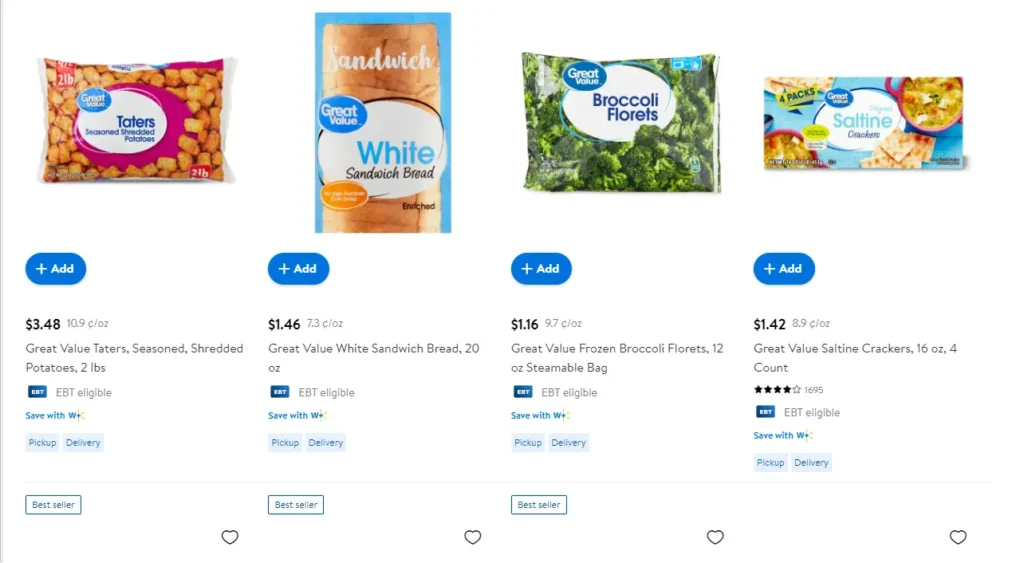
Great Value is one of Walmart’s most prominent private label brands, covering a wide variety of product categories.
It was introduced in the 1990s to deliver affordable, reliable products to Walmart customers, and has since become a staple in many households.
The Great Value brand covers an extensive range of products.
While it initially focused on pantry staples like pasta, canned goods, cereal, and baking goods, it has expanded over the years to encompass virtually every category in the store, including dairy products, meat, frozen foods, cleaning products, and health and beauty items.
Great Value products often have good customer reviews.
Many customers appreciate the affordable pricing and comparable quality, with some items being favored over their branded counterparts.
Equate
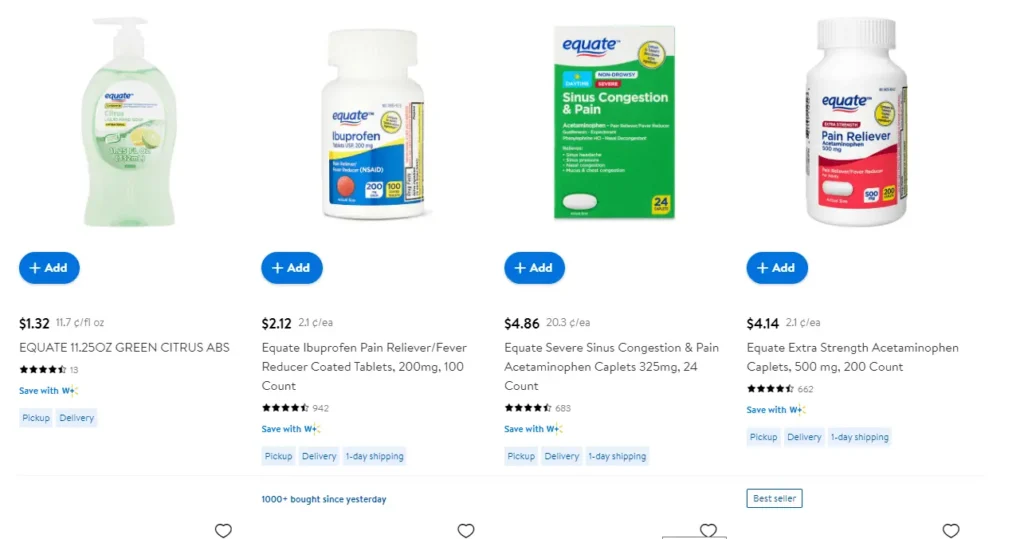
Equate is another of Walmart’s private label brands, primarily focused on health and personal care items.
Equate offers a wide variety of health and personal care products.
This includes over-the-counter medications, first aid supplies, oral care, skin care, hair care, dietary supplements, feminine care products, and more.
Equate products are exclusive to Walmart, which means customers can rely on their availability in-store and online.
This convenience and consistency further enhance the brand’s appeal.
Sam’s Choice
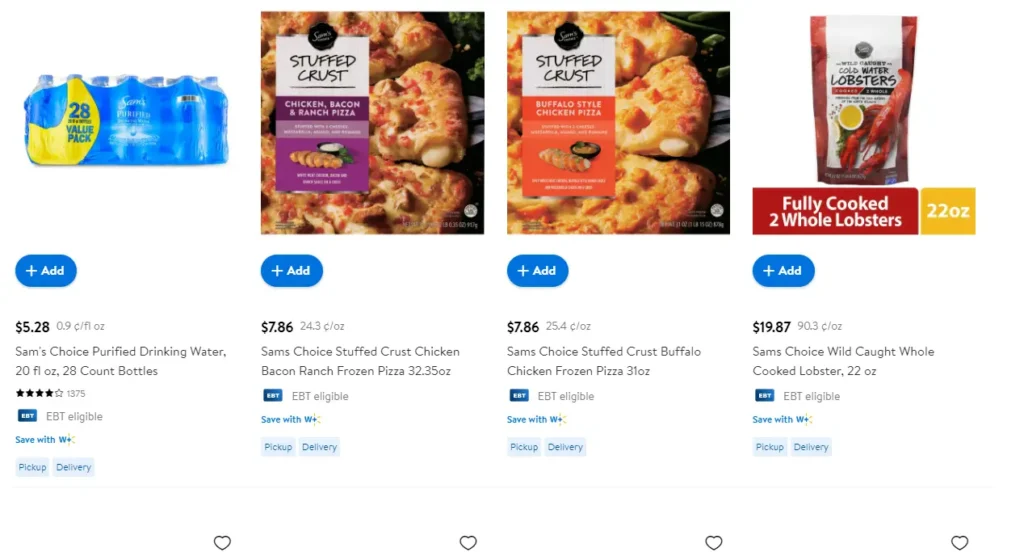
Sam’s Choice is another private label brand owned by Walmart, primarily focused on groceries and named after Walmart’s founder, Sam Walton.
It’s known for offering a range of gourmet-style grocery items at affordable prices.
Sam’s Choice offers a diverse range of products, largely focused on food and beverages. The brand covers a wide array of categories, including (but not limited to) frozen and refrigerated foods, pantry items, snacks, beverages, and pizzas.
Some standout items include premium cuts of meat, gourmet flavored coffees, specialty cheeses, and artisanal bread.
Sam’s Choice products are sold exclusively at Walmart stores and through Walmart’s online shopping platform.
Sam’s Choice often introduces unique and innovative products that you might not typically find in a private label brand. For example, they have released limited-edition items and regional specialties, adding a sense of novelty and exclusivity to the brand.
Ol’Roy
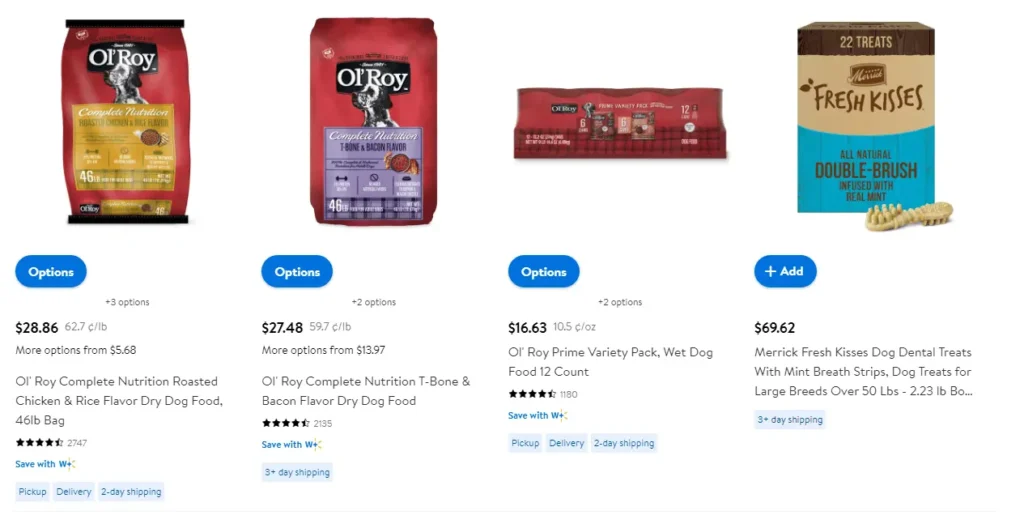
Ol’ Roy is Walmart’s private label brand for dog food and treats. Named after Sam Walton’s bird dog, Ol’ Roy is designed to provide quality, affordable nutrition for dogs.
This Walmart private label brand offers a comprehensive selection of dog food and treats. This includes dry food, wet food, and a variety of snacks and treats suitable for dogs of different sizes, breeds, and life stages.
Ol’ Roy aims to offer complete and balanced nutrition for dogs. Their products often contain a mix of proteins, grains, and vegetables, formulated to meet the nutritional needs of dogs.
However, the nutritional value can vary from product to product, so it’s important for sellers to understand the specifics of the items they’re selling.
Parent’s Choice
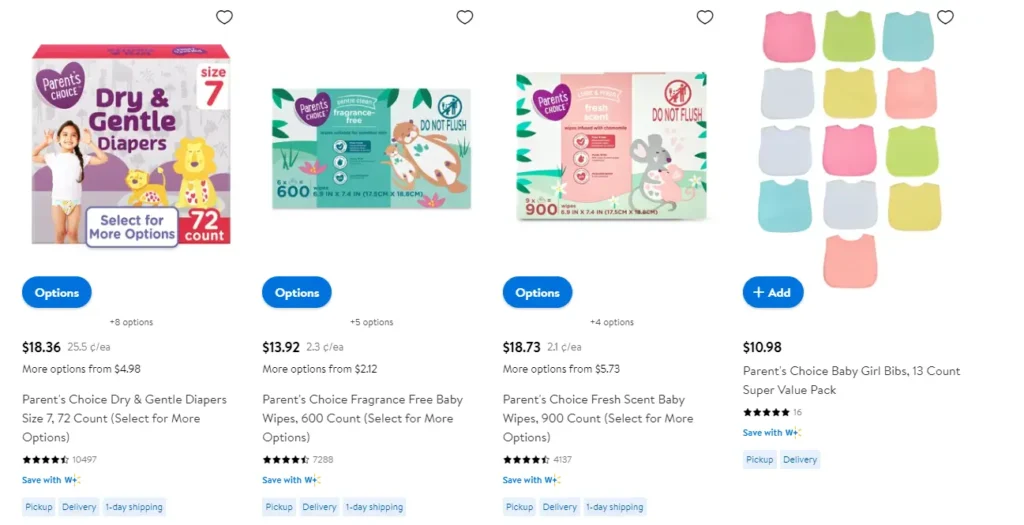
Parent’s Choice is Walmart’s private label brand focusing on baby products. It was launched in 1998 and has since been a leading choice for parents looking for quality baby essentials at an affordable price.
Parent’s Choice offers a broad array of baby products. This includes baby food, diapers, baby wipes, formula, baby bedding, and other baby accessories. Essentially, it covers most basic needs for infant care.
Parent’s Choice products are made to meet high safety standards, which is a critical factor for products intended for babies. For instance, their baby food products often have no artificial preservatives or flavors, and their baby gear adheres to safety regulations.
How to Sell Private Label Products on Walmart
Starting a private label brand on Walmart involves several steps, from product identification and supplier sourcing to branding and marketing.
Here’s a step-by-step guide:
1. Identify Your Product
Determine the type of product you want to create. This should be based on a combination of your own interests and expertise, market demand, and profitability potential.
Thorough market research is key here. You can use tools like Google Trends, Ecom Circles Extension, and Walmart’s best sellers list to identify potential product opportunities.
2. Find a Supplier
Once you have a product in mind, you’ll need to find a supplier or manufacturer who can produce it for you.
You can source from suppliers and manufacturers domestically or internationally (such as China via Alibaba).
Make sure to request samples and do thorough quality checks. It’s also important to check the manufacturer’s certifications and ensure they can comply with any regulatory requirements for your product.
For example, if you are planning to sell cosmetic products, your supplier or manufacturer should have an ISO 22716 certification.
This is a standard developed by the International Organization for Standardization (ISO) for the cosmetics industry. It gives guidelines for the production, control, storage, and shipment of cosmetic products.
Walmart has a “put the customer first” policy. They can be very strict in terms of the quality of items sold on their marketplace. So ensure you duly research your suppliers and manufacturers.
3. Brand Development
As you can see from the top Walmart private label brands listed above, they all have their unique brand name to make them stand out from other Walmart products, even though they are owned by Walmart.
This goes to show that branding is at the heart of private labeling.
Develop a brand name, logo, and overall design that will appear on your product and its packaging.
You should also consider getting a trademark for your brand to protect it.
4. Product Listing
Once you have all the above settled i.e. finding a product, a supplier, and developing your brand, the next step is to create your product listing on Walmart.
Make sure to provide detailed product descriptions, high-quality images, and competitive pricing. Include keywords that potential customers might use to search for your product. These practices can help improve the optimization of your product and boost visibility.
5. Promote Your Product
This is an optional step, but we recommend you consider using various marketing strategies to promote your product if you have the budget for it.
This could include pay-per-click advertising, social media marketing, content marketing, and using Walmart’s advertising features such as sponsored ads.
Read our post on Walmart sponsored ads to learn how they can help promote your products on the marketplace.
6. Manage Inventory and Fulfill Orders
Once your products start selling, you’ll need to manage your inventory and fulfill orders in a timely manner. This is crucial for maintaining high seller ratings on Walmart.
You can use tools like the Ecom Circles automated dropshipping software to simplify inventory management.
7. Customer Service and Reviews
Provide excellent customer service and encourage satisfied customers to leave reviews.
Positive reviews can significantly boost your product’s visibility and trustworthiness.
Why Consider Walmart Private Label?
Embracing the private label business model as a Walmart seller unlocks a world of potential advantages that could significantly impact your business.
One of the most compelling advantages is the opportunity to differentiate your products from the competition. In a marketplace that’s often saturated with similar products, having a unique, private label product can make you stand out.
By collaborating with suppliers, you can customize your products based on your target customers’ needs and preferences, ensuring that you meet consumer demand in a distinctive way.
This could involve anything from tweaking the design or providing a unique size or color variant that isn’t available elsewhere.
Moreover, private labeling offers a unique avenue to strengthen and build your brand. Unlike selling generic products, private label products carry your brand’s name, logo, and aesthetic.
This not only creates an immediate visual distinction for your customers but also fosters an emotional connection.
Each time a customer uses or interacts with your product, they’re forming an association with your brand, which can build trust and loyalty over time.
This is crucial in a marketplace like Walmart where building a strong, recognizable brand can lead to repeat customers and increased sales.
Lastly, and importantly for your bottom line, private labeling offers control over your profit margins.
Since you’re involved in the product creation process, you can make strategic decisions about sourcing, manufacturing, and pricing that align with your profit goals.
You can select cost-effective materials, negotiate manufacturing costs, and set your retail price based on your desired profit margin.
Unlike with wholesale products where the profit margin is often razor-thin, with private labeling, you have more control over how much you make on each sale.




